Duke of Manchester
Duke of Manchester is a title in the Peerage of Great Britain, and the current senior title of the House of Montagu. It was created in 1719 for the politician Charles Montagu, 4th Earl of Manchester.
| Dukedom of Manchester | |
|---|---|
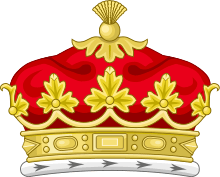 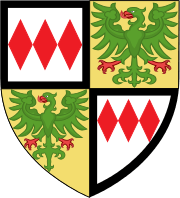 Quarterly, 1st & 4th: Argent, 3 fusils conjoined in fess gules, a bordure sable (Montagu); 2nd & 3rd: Or an eagle displayed vert beaked and membered gules (Monthermer). | |
| Creation date | 13 April 1719 |
| Monarch | George I |
| Peerage | Peerage of Great Britain |
| First holder | Charles Montagu, 4th Earl of Manchester |
| Present holder | Alexander Montagu, 13th Duke |
| Subsidiary titles |
|
| Former seat(s) | |
Origin
Their ancestor was Richard Ladde, grandfather of the Lord Chief Justice Sir Edward, who changed his name to Montagu around 1447. His descendants claimed a connection with the older house of Montagu or Montacute, Barons Montagu or Montacute and Earls of Salisbury, but there is no sound evidence that the two families were related. A case has been made out for the possibility that the Ladde alias came from a division among coheirs about 1420 of the remaining small inheritance of a line of Montagus at Spratton and Little Creton, also in Northamptonshire.[1]
The judge Sir Edward Montagu's grandson, Edward Montagu, was raised to the peerage as 1st Baron Montagu of Boughton. He is the ancestor of the Dukes of Montagu. His brother, Sir Henry Montagu (c. 1563–1642), who served as Lord Chief Justice as well as Lord High Treasurer and Lord Privy Seal, was in 1620 raised to the Peerage of England as Viscount Mandeville, with the additional title Baron Montagu of Kimbolton, of Kimbolton in the County of Huntingdon. In 1626, he was made Earl of Manchester, of Manchester in the County of Lancaster.[2] It is said, erroneously, that the title referred not to the city of Manchester, but to Godmanchester in Huntingdonshire. The word "God" was deliberately excluded from the title, as Henry thought it would be blasphemous for him to be known as "Lord Godmanchester".[3]
His son, the 2nd Earl, was a prominent Parliamentary General during the Civil War, but later supported the restoration of Charles II. His son, the 3rd Earl, represented Huntingdonshire in the House of Commons. His son was the 4th Earl, who in 1719 was created Duke of Manchester.
Descent
Charles, 1st Duke of Manchester, was succeeded by his eldest son. The 2nd Duke notably served as Captain of the Yeomen of the Guard in the administration of Sir Robert Walpole. He was childless, and on his death, the titles passed to his younger brother, the 3rd Duke. He had earlier represented Huntingdonshire in Parliament. He was succeeded by his son, the 4th Duke. He was Ambassador to France and served as Lord Chamberlain of the Household. His son, the 5th Duke, was Governor of Jamaica between 1827 and 1830 also held office as Postmaster General. He was succeeded by his son, the 6th Duke. He represented Huntingdon in the House of Commons as a Tory.
His eldest son, the 7th Duke, was Conservative Member of Parliament for Bewdley and Huntingdonshire. His son, the 8th Duke, briefly represented Huntingdonshire in Parliament. He was succeeded by his eldest son, the 9th Duke. He sat on the Liberal benches in the House of Lords and served as Captain of the Yeomen of the Guard in the Liberal administration of Sir Henry Campbell-Bannerman. In the twentieth century, mismanagement and profligacy resulted in the wholesale depletion of the Dukedom's estates. Generational instability caused further damage to the family's honour: both the 11th and 12th Dukes had a criminal record.[4]
Seats
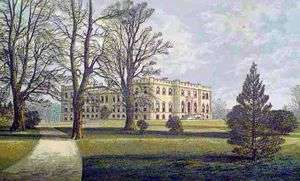
The principal estate of the Dukes of Manchester was Kimbolton Castle. It was sold, together with 50 acres of parkland, by the 10th Duke in 1951, and is now a private school. A remaining 3,250 acres of the estate were sold by his eldest son and heir in 1975. The other family seat was Tandragee Castle, in County Armagh, Northern Ireland. It was sold in 1955, and the remaining estate in 1975, and is now the headquarters of Tayto (NI) Ltd.[4]
Arms
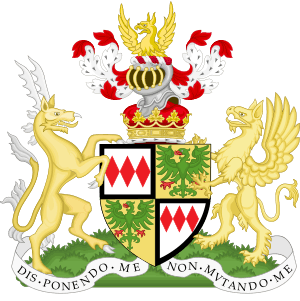 |
|
The arms of the Duke of Manchester have the following blazon: Quarterly, 1st & 4th: Argent, 3 fusils conjoined in fess gules (Montagu); 2nd & 3rd: Or an eagle displayed vert beaked and membered gules (Monthermer).[7] The fusils or diamond shapes in the Montagu arms were originally intended to represent a range of mountains,[8] as the name comes from the old French mont agu meaning "pointed hill".[9] The arms represent a claim to be a cadet of the medieval Montagu (Montacute) family, earls of Salisbury, for which there is no proof (see above origins).
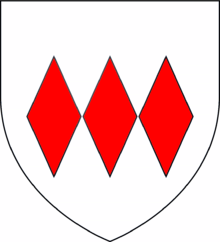
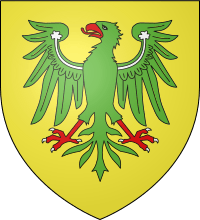
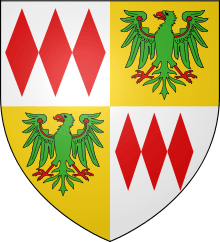

Titles and styles
The Duke of Manchester holds the subsidiary titles Earl of Manchester, Viscount Mandeville, and Baron Montagu of Kimbolton.
The Duke of Manchester is styled Your Grace (spoken style) or His Grace (reference style), alternatively Sir.
The heir apparent to the Dukedom takes the courtesy title Viscount Mandeville, and the heir apparent's heir apparent, when such exists, is styled Lord Kimbolton.[10]
Burial place
Many members of the Montagu family (Earls and Dukes of Manchester) are buried at St Andrew's Church, Kimbolton, Cambridgeshire (historically in Huntingdonshire). Several Montagu monuments still exist in the South Chapel, while the Montagu vault (extended in 1853) is located beneath the North Chapel.[11] The 12th Duke of Manchester was cremated at Bedford Crematorium in 2002.
Viscount Mandeville (1620)
| Created by James I of England | ||||||
|---|---|---|---|---|---|---|
| # | Name | Life span | Period | Spouse | Notes | Other titles |
| 1 | Henry Montagu | c. 1563 – 1642 | 1620–1642 | (1) Catherine Spencer (2) Anne Halliday, née Wincot (3) Margaret Crouch |
Baron Montagu of Kimbolton | |
Earls of Manchester (1626)
| Created by Charles I of England | ||||||
|---|---|---|---|---|---|---|
| # | Name | Life span | Period | Spouse | Notes | Other titles |
| 1 | Henry Montagu | c. 1563 – 1642 | 1626–1642 | (1) Catherine Spencer (2) Anne Halliday, née Wincot (3) Margaret Crouch |
Viscount Mandeville Baron Montagu of Kimbolton | |
| 2 | Edward Montagu | 1602–1671 | 1642–1671 | (2) Lady Anne Rich | Son of the preceding | |
| 3 | Robert Montagu | 1634–1683 | 1671–1683 | Anne Yelverton | Son of the preceding | |
| 4 | Charles Montagu | c. 1662 – 1722 | 1683–1722 | Dodington Greville | Son of the preceding | |
Dukes of Manchester (1719)
| Created by George I of Great Britain | ||||||
|---|---|---|---|---|---|---|
| # | Name | Life span | Period | Spouse | Notes | Other titles |
| 1 | Charles Montagu | c. 1662 – 1722 | 1719–1722 | Dodington Greville | Earl of Manchester, Viscount Mandeville, Baron Montagu of Kimbolton | |
| 2 | William Montagu | 1700–1739 | 1722–1739 | Lady Isabella Montagu | Son of the preceding | |
| 3 | Robert Montagu | 1710–1762 | 1739–1762 | Harriet Dunch | Brother of the preceding | |
| 4 | George Montagu | 1737–1788 | 1762–1788 | Elizabeth Dashwood | Son of the preceding | |
| 5 | William Montagu | 1771–1843 | 1788–1843 | Lady Susan Gordon | Son of the preceding | |
| 6 | George Montagu | 1799–1855 | 1843–1855 | (1) Millicent Sparrow (2) Harriet Sydney Dobbs |
Son of the preceding | |
| 7 | William Montagu | 1823–1890 | 1855–1890 | Countess Louisa of Alten | Son of the preceding | |
| 8 | George Montagu | 1853–1892 | 1890–1892 | Consuelo Yznaga | Son of the preceding | |
| 9 | William Montagu | 1877–1947 | 1892–1947 | (1) Helena Zimmerman (2) Kathleen Dawes |
Son of the preceding | |
| 10 | Alexander Montagu | 1902–1977 | 1947–1977 | (1) Nell Vere Stead (2) Elizabeth Fullerton |
Son of the preceding | |
| 11 | Sidney Montagu | 1929–1985 | 1977–1985 | (1) Adrienne Valerie Christie (2) Andrea Joss |
Son of the preceding | |
| 12 | Angus Montagu | 1938–2002 | 1985–2002 | (1) Mary Eveleen McClure (2) Diane Pauline Plimsaul (3) Anne-Louise Taylor (4) Biba Jennians |
Brother of the preceding | |
| 13 | Alexander Montagu, presumed 13th Duke of Manchester[lower-alpha 1] |
b. 1962 | 2002–present | (1) Marion Stoner (2) Wendy Dawn Buford (3) Laura Smith |
Son of the preceding | |
- The 13th Duke of Manchester has not proven succession to the Peerage, and does not appear on the Roll of the Peerage; hence he may not be legally recognised as a Peer in official documents.[12]
Family tree
References
- Wagner, Anthony (1960). English Genealogy. Oxford: Oxford University Press. ISBN 9780712667241.
The explanation of a fifteenth century yeoman's Norman name might sometimes be female descent from a knightly house through a coheir. The Montagus of Boughton, Northhamptonshire, who acquired a barony in 1621, an earldom in 1689, the dukedom of Montagu in 1705, and in their younger branches the earldom of Manchester in 1626, the dukedom of Manchester in 1719, and the earldom of Sandwich in 1660, descended from Richard Montagu alias Ladde, a yeoman or husbandman, living in 1471 at Hanging Houghton, Northamptonshire, where the Laddes had been tenants since the fourteenth century. Alias names, in some respect the forerunners of modern compound (or double-barreled) name, were common in the Middle Ages. In the earliest times, when surnames were new, an alias may just mean indecision between equally attractive alternatives. Later they sometimes indicate bastardy (one name perhaps being the father's and one the mother's), but in most cases probably mark inheritance through an heiress whose name was thus perpetuated. A good case has been made out for the possibility that the Ladde alias came from a division among coheirs about 1420 of the remaining small inheritance of a line of Montagus at Spratton and Little Creton, also in Northamptonshire. This line was of knightly origin and probably a branch of the baronial Montagus (Earls of Salisbury from 1337), whose almost certain ancestor Dru de Montagud was a tenant-in-chief in 1086. Other yeoman Montagus are found in Buckinghamshire from 1354 when Roger Montagu appears as a witness to a quitclaim of land in Great Kimble, notably in Halton where a family of Montagu alias Elot held land from about 1440 to 1610. A line of Montagus found in Waddesdon from about 1540 may have branched from these. These in the eighteenth century were shepherds and drovers and one set up in Aylesbury as a wheelwright and another as a tailor. Another line, also possibly branched from Halton, is found at Boveney and Dorney in the sixteenth and seventeenth centuries. This produced Richard Montagu, Bishop of Chichester (1628–38) and Norwich (1638–41), and Peter Montagu, who settled in Virginia.
- Masters, Brian (2001). The Dukes: The Origins, Ennoblement and History of Twenty-Six Families. London: Random House. p. 336. ISBN 9780712667241.
- Brooke, Christopher (1985). A History of Gonville and Caius College. Boydell & Brewer Ltd. p. 127. ISBN 9780851154237.
- Scriven, Marcus (2009). Splendor and Squalor: The Disgrace And Disintegration of Three Aristocratic Dynasties. London: Atlantic Books. pp. 137–225. ISBN 9781843541240.
- Boutell, Charles (1914). The Handbook to English Heraldry. London: Reeves & Turner. p. 16. Retrieved 14 May 2015.
- "Last name: Montague". The Internet Surname Database. Retrieved 14 May 2015.
- Debrett's Peerage, 1968, Montagu of Beaulieu (original form of), p.788
- Boutell, Charles (1914). The Handbook to English Heraldry. London: Reeves & Turner. p. 16. Retrieved 14 May 2015.
- "Last name: Montague". The Internet Surname Database. Retrieved 14 May 2015.
- "Courtesy Titles". Cracroft's Peerage. Retrieved 10 June 2016.
- Guided Tour of St Andrew's Church, Kimbolton, access date 27 July 2015
- "Roll of the Peerage". College of Arms. Retrieved 23 January 2020.
Under the terms of the Royal Warrant of 1 June 2004 any person who succeeds to a Peerage must prove his or her succession and be placed on the Roll, otherwise that person may not be legally recognised as a Peer in official documents.
Further reading
| Wikimedia Commons has media related to Dukes of Manchester. |
- Kidd, Charles, and Williamson, David (editors): Debrett's Peerage and Baronetage 1990 edition. New York, St Martin's Press, 1990,
- McNeill, Ronald John (1911). . In Chisholm, Hugh (ed.). Encyclopædia Britannica. 17 (11th ed.). Cambridge University Press. pp. 543–544.
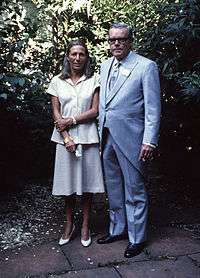
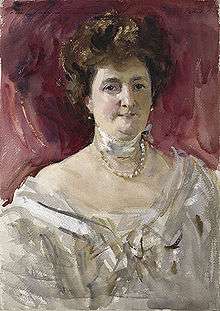
%2C_later_Duchess_of_Devonshire.jpg)